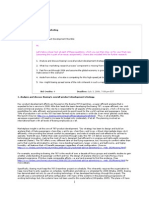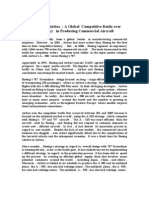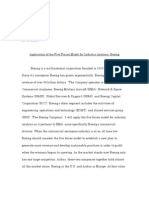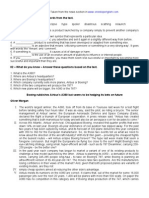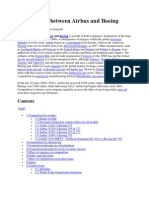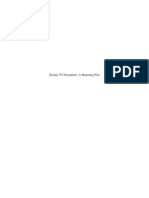Topic Paper - Week 3: Boeing Verses Airbus
Topic Paper - Week 3: Boeing Verses Airbus
Uploaded by
cthlah01Copyright:
Available Formats
Topic Paper - Week 3: Boeing Verses Airbus
Topic Paper - Week 3: Boeing Verses Airbus
Uploaded by
cthlah01Original Title
Copyright
Available Formats
Share this document
Did you find this document useful?
Is this content inappropriate?
Copyright:
Available Formats
Topic Paper - Week 3: Boeing Verses Airbus
Topic Paper - Week 3: Boeing Verses Airbus
Uploaded by
cthlah01Copyright:
Available Formats
Student: Topic Paper File: TP3CH 1
Topic Paper Week 3
Boeing verses Airbus
Submitted by
Prepared for
Dr. James. Ibe
BUSN 6120, Managerial Economics
Spring 2, 2015
Section QC
Webster University
04/05/2015
CERTIFICATE OF AUTHORSHIP: I certify that I am the author. I have cited all sources from
which I used data, ideas, or words, either quoted directly or paraphrased. I also certify that this
paper was prepared by me specifically for this course.
04/05/2015
Signature
Date
Boeing verses Airbus
Student: Topic Paper File: TP3CH 2
The Boeing Aircraft Company has dominated the commercial aircraft market for decades,
but its position of influence has lessened in recent years. Its chief competitor, Airbus, has made
significant market gains, and may be posed to become the number one producer of commercial
aircraft in the near future.
Companies Background
Boeings was founded in 1910 by William Boeing who turned a shipyard into an airplane
factory in Seattle, Washington. Its now a leading manufacturer of commercial jetliners and
military aircraft and is the worlds leading aerospace company. Beyond aircraft, Boeing designs
and manufactures missiles, satellites, launch vehicles and advanced information and
communication systems and provides support services to the military and commercial airlines.
At Boeing, a true corporation incorporates three main elements: the products and services, its
business practices, and its community engagement. One third of what defines Boeing as a
corporation is its fulfillment of its social obligations. Boeings website says it indeed does
have a responsibility to its stakeholders, but also to the communities in which its employees live.
Airbus was founded in 1970. Its headquarters is in Blagnac, France. Airbus roots date
back to 1967 where a consortium of European aerospace firms formed to compete with US firms
such as Boeing and McDonnell Douglas. In 1970 Airbus Industrie formed, backed by French,
German, Spanish, British government backed entities and becomes a global pioneer in
aeronautics, space and defense related services. In 2001 the consortium was merged as European
Aeronautic Defense and Space Company (EADS). The company was rebranded as Airbus Group
on January 2, 2014. Airbus Group unites the capabilities of Airbus, Airbus Defense and Space
and Airbus Helicopters. Corporate Social Responsibility is highlighted on the Airbus Group
Student: Topic Paper File: TP3CH 3
website and the company publishes a Corporate Responsibility and Sustainability Annual Report
(EADS). In its report, Airbus details goals for greenhouse gas reductions that are being set by
the airline industry. The company cites product innovation efforts in fuel-efficient aircraft and
research for sustainable alternative fuel production as CSR initiatives for the firm. A Reputation
Institute 2013 study tracking CSR perception ranked Airbus as 71 of the top 100 companies in
CSR (Smith).
Boeing and Airbus approach to the aircraft marketplace
The Airbus business model concentrates mainly on the Hub-and-Spoke system. The A380
airplane will be able to transport between 555 and 800 passengers, and is going to serve long
haul flights between Hubs all over the world. In addition it is possible to operate the A380 with
much less costs than the 747-400. This will be especially very profitable in, for example the
Asian market, where the demand is much higher than the available slot capacity. Therefore it
would be really lucrative for Asian carriers to be able to fly a big amount of passengers at the
same time and increase the daily frequency on a certain route. Airbus forecasts say that there will
be a demand for 1600 A380s over the next 20 years, which mainly focuses on the Asian market
where China is seen as the country with the most growing potential. In order to be more present
in Asia and gain a bigger part of the future market share, Airbus is now thinking about
outsourcing parts of its production line to countries like Japan and China, where the main share
holder EADS is even thinking about building a manufacturing plant. This is a critical topic
within the company, because some people believe that by doing so, the Europeans could loose
their technological lead compared to the Chinese who then would start building their own
aircrafts and stop buying the products of other manufacturers. Airbus also developed a backup
Student: Topic Paper File: TP3CH 4
plan by launching the A350 program. This aircraft can be seen as a competitor for the 787, and
will flying for the first time in mid 2008, approximately one year after the Dreamliner. Some
people think that the A350 is Airbus insurance for the case that the Hub-and-Spoke system
wont be profitable in the future and Airlines decide to invest into the Point-to-Point traffic.
The Boeing Business Model focuses on more frequent and direct services (even over long
ranges) in preference to the Hub-and-Spoke model. At the beginning of this year, Boeing
launched the 7E7-800 project (where E stands for efficient), which should take the company
back to number one in the world market. Due to the way it is build it is really light and therefore
very cost efficient and you can transport up to 250 passengers with it. With the 787-Dreamliner
(which it is called since January 2005), it is possible to operate long distance flights from
relatively small airports. Boeing emphasizes that direct connections would require less starts and
landings and relates therewith to the lower air traffic noise experienced by the residents of the
airport areas. The new model, according to Boeing, is 60 percent more quiet than Airbus aircrafts
of the same size (except the new A350), and needs up to 20 percent less fuel. Relating to the
Asian market, Boeing is confident that the 787 has high potential especially in China and Japan
because even between relatively small cities the demand for direct connections is very high due
to the big amount of people living there. An innovation for Boeing is that, for the first time in
the companies history, up to 35% of all parts of the 787 will be manufactured in the Far East,
mainly in Japan. This relates to the strong business and especially political relationships between
the two countries. In order to stay competitive in all market segments, Boeing decided to build an
extended version of the 747. In this high-capacity airplane, airlines will be able to transport 400500 passengers at the same time and it is therefore Boeings correspondent to the A380. Our
strategy has been to design and build an airplane that will take passengers where they want to go,
Student: Topic Paper File: TP3CH 5
when they want to go, without intermediate stops; do it efficiently while providing the utmost
comfort to passengers; and make it simple and cost-effective for airlines to operate, Bentrott
says. Rather than seek economies through scale, the 787 will deliver economy through
technological innovation, making the most of newly designed, fuel-efficient twin engines and
lightweight composite materials. The 787 offers a very different take on the flying experience,
too, focusing on comfort rather than perks that could be eliminated by airlines: more standing
headroom, larger windows and bathrooms, and higher humidityall features that will benefit
passengers regardless of seat configuration.
Similarities and differences
Airbus is primarily focused on the economy of transporting many passengers at once to
major airports and anticipating large demand for this type of service in the Asian markets.
Airbus also plans to start producing parts in the Asian market to support their Asian business
model. They have created a backup plan for Point-to-Point transportation incase the Hub-andSpoke model is not as successful as predicted.
Boeing is primarily focus on the opposite of Airbus, a Point-to-Point model with a
backup plan of Hub-and-Spoke. They are investing in innovation to reduce fuel needs and
increase passenger satisfaction through more luxury accommodations. Relating to the Asian
market, Boeing is confident that the 787 has high potential especially in China and Japan because
even between relatively small cities the demand for direct connections is very high due to the big
amount of people living there. Parts will be manufactured in the Far East, mainly in Japan. This
relates to the strong business and especially political relationships between the two countries.
Student: Topic Paper File: TP3CH 6
Boeing and Airbus essentially make up a duopoly in supplying aircraft
to the commercial airline industry. The outlook is strong for both companies
as barriers to entry are high in the industry. Passenger traffic is
outperforming GDP growth and air travel has been resilient to global
economic crises. Each firm has been through a recent period of significant
investments in new technologies as platforms and fleets turnover in favor of
more efficient aircraft. Each relies heavily on supplier relationships, growth
from emerging economies where orders are subject to higher risk of
cancellation, and dependency on realizing production efficiencies that reduce
costs and increase output in order to achieve profitability on new product
investments. The defense and aerospace segments of their businesses face
risk from downturns in government and military spending.
Student: Topic Paper File: TP3CH 7
Student: Topic Paper File: TP3CH 8
Student: Topic Paper File: TP3CH 9
Probable outcome of their ongoing competition
Airbus and Boeing have a producer-producer rivalry in which each is predicting what
future demand of the customer will be and basing production design of aircraft around it. Each
has taken a major investment in opposite approaches, Airbus being a hub-and-spoke approach
and Boeing being a point-to-point approach with luxury customer accommodations. Both are
planning their future strategies by predicting future demand based on historical information and
customer surveys.
I think the most likely outcome will be when market equilibrium is
established there will be a 50/50 share between the two companies because both business
strategies seem to have sound logic, although Boeing seems to have done more customer
research. To stay competitive, the two companies focused on different segments of the market
hoping that the segment they predicted will be most profitable while also keeping an eye on
alternative approach just incase. Because both used sound business methodologies in making
their decisions, it is probable that each will become dominant in their predicted market segment
and that demand for each type of service will sustain profits.
Bibliography
Baye, Michael R. Managerial Economics and Business Strategy, 8th Ed. Copyright 2014.
McGraw-Hill/Irwin. Boston, MA.
AIRBUS & BOEING A FINANCIAL ANALYSIS Airline Industry May 31, 2014 Taposh Dutta
Roy & Team
Boeing.Com - Corporate Citzenship. n.d. 1 5 2014
<http://www.boeing.com/boeing/companyoffices/aboutus/community/>.
Competition Between Boeing And Airbus. 123HelpMe.com. 05 Apr 2015
<http://www.123HelpMe.com/view.asp?id=164292>.
SEC.GOV. Corporate Governance Principles of the Boeing Company. n.d. 1 May 2014
<http://www.sec.gov/Archives/edgar/data/12927/000119312507046463/dex9
92.htm>.
You might also like
- Financial Statement Analysis Beoing Vs AirbusDocument10 pagesFinancial Statement Analysis Beoing Vs AirbusFagbola Oluwatobi OmolajaNo ratings yet
- Aircraft Engine Manual Jt8dDocument4 pagesAircraft Engine Manual Jt8dAli88_azizi20% (10)
- Questions To Chapter 1Document3 pagesQuestions To Chapter 1Clyde Saul100% (6)
- Airbus A380 A Risk Management Framework - Unpublishedwork PDFDocument48 pagesAirbus A380 A Risk Management Framework - Unpublishedwork PDFSumanth ShettyNo ratings yet
- Airbus Case StudyDocument12 pagesAirbus Case StudyHemant Soni0% (1)
- BoeingDocument42 pagesBoeingHarsh SaxenaNo ratings yet
- Case For Airbus by LincolnWood and LinhDuongDocument4 pagesCase For Airbus by LincolnWood and LinhDuongsaikunnathNo ratings yet
- 31 Cannegieter Ranging CapabilitiesDocument3 pages31 Cannegieter Ranging CapabilitiesW.J. ZondagNo ratings yet
- Airbus vs. Boeing NotesDocument4 pagesAirbus vs. Boeing NotesEsteban AguirreNo ratings yet
- Maintenance Planning Optimization 737NG PDFDocument183 pagesMaintenance Planning Optimization 737NG PDFOscar SánchezNo ratings yet
- Posting 87396Document4 pagesPosting 87396hzayounNo ratings yet
- Boeing and Airbus - CaseDocument2 pagesBoeing and Airbus - CaseAnkit Shah33% (3)
- Five Forces ModelDocument8 pagesFive Forces ModelAndrew PenroseNo ratings yet
- Strag Mag ExamDocument8 pagesStrag Mag Examtanhuishan16No ratings yet
- Boeing Vs AirbusDocument12 pagesBoeing Vs AirbusgoekhankolukisaNo ratings yet
- BoeingDocument7 pagesBoeingShraddha MalandkarNo ratings yet
- Competition: Airbus and BoeingDocument15 pagesCompetition: Airbus and BoeingHenry DunaNo ratings yet
- Airbus vs. BoeingDocument3 pagesAirbus vs. Boeingankit baidNo ratings yet
- Boeing Airbus CaseDocument2 pagesBoeing Airbus CaseVinam Gosar100% (1)
- Case Study 1Document5 pagesCase Study 1PrincessNo ratings yet
- AirbusDocument14 pagesAirbusMostafa Hazem EL Nemr100% (1)
- Boeing Bets The Company Case StudyDocument3 pagesBoeing Bets The Company Case StudystudentNo ratings yet
- Boeing Bets The Company Case StudyDocument3 pagesBoeing Bets The Company Case StudyMansoor AhmadNo ratings yet
- Cherry Airbus, MC Donnell Doughlas, United Contingental Holdings, Inc.Document7 pagesCherry Airbus, MC Donnell Doughlas, United Contingental Holdings, Inc.dinysulisNo ratings yet
- Boeing 787 OutsourcingDocument14 pagesBoeing 787 OutsourcingPat0% (1)
- Case StudyDocument2 pagesCase StudyMuhammad Shafiq Gul100% (3)
- Business Policy: Case Study: Boeing Bets The CompanyDocument3 pagesBusiness Policy: Case Study: Boeing Bets The CompanyAli Shaharyar ShigriNo ratings yet
- Extra Reading03Document3 pagesExtra Reading03Marcelo SilvaNo ratings yet
- SM Case StudyDocument3 pagesSM Case Studymubarek oumerNo ratings yet
- An20220727 131Document10 pagesAn20220727 131Abdullah AkhtarNo ratings yet
- Competition Between Airbus and BoeingDocument12 pagesCompetition Between Airbus and BoeingSrikanth PsNo ratings yet
- Case QuestionsDocument7 pagesCase QuestionsAnubhavNo ratings yet
- Airbus Case StudyDocument2 pagesAirbus Case StudyRahul JainNo ratings yet
- Boeing 787 Case StudyDocument17 pagesBoeing 787 Case StudyJosh Krisha50% (2)
- 787 Financial AnalysisDocument25 pages787 Financial AnalysisJason MakowskiNo ratings yet
- Boeing Final ExamDocument25 pagesBoeing Final ExamfouadNo ratings yet
- Globalisation: Airbus and The Worldwide Growing Air Travel DemandDocument14 pagesGlobalisation: Airbus and The Worldwide Growing Air Travel DemandSamuel LohNo ratings yet
- Case Study Airbus Vs BoingDocument25 pagesCase Study Airbus Vs BoingRana Shahzaib100% (1)
- Group 5 Airbus (6) SolutionDocument8 pagesGroup 5 Airbus (6) Solutionlalapopa2003No ratings yet
- A 3801Document6 pagesA 3801Rahul ChaudharyNo ratings yet
- Case QuestionsDocument9 pagesCase QuestionsAnubhavNo ratings yet
- Boeing Case StudyDocument42 pagesBoeing Case StudyLaxmi100% (17)
- Tutorial3 Case AircraftDocument3 pagesTutorial3 Case AircraftQiu yii0% (1)
- Airbus Case AnalysisDocument4 pagesAirbus Case AnalysisJeJe MarkNo ratings yet
- Airbus Vs Boeing-: International CompetitionDocument9 pagesAirbus Vs Boeing-: International Competitionrabi1984npNo ratings yet
- Case BoeingDocument5 pagesCase BoeingPatricia gNo ratings yet
- Boeing-787-Case - Risk Identification FinalDocument14 pagesBoeing-787-Case - Risk Identification FinalRyan joeNo ratings yet
- Boeing Vs Airbus PDFDocument16 pagesBoeing Vs Airbus PDFBo BéoNo ratings yet
- External Analysis Boeing Assignment Final 2Document7 pagesExternal Analysis Boeing Assignment Final 2Himmie Eugene LangfordNo ratings yet
- Literature Review Airline IndustryDocument7 pagesLiterature Review Airline Industryd0vidihujam3100% (2)
- Study of Price, Product and Promotion of BoeingDocument29 pagesStudy of Price, Product and Promotion of BoeingNeha GoyelNo ratings yet
- Airbus Vs BoeingDocument11 pagesAirbus Vs Boeingpundirv1993100% (1)
- Aircraft Cabin Interiors MarketDocument7 pagesAircraft Cabin Interiors MarketsajeshsimonNo ratings yet
- AirbusDocument23 pagesAirbusSharad Sharu100% (1)
- Boeing CaseDocument11 pagesBoeing CaseM Imran NaeemNo ratings yet
- Airbus Versus Boeing RevisitedDocument11 pagesAirbus Versus Boeing RevisitedArif PranandaNo ratings yet
- Reducing Business Jet Carbon Footprint: Using the Power of the Aircraft Electric Taxi SystemFrom EverandReducing Business Jet Carbon Footprint: Using the Power of the Aircraft Electric Taxi SystemNo ratings yet
- Construction Quality PlanDocument82 pagesConstruction Quality PlanUzuazor Diamond100% (1)
- Indo Africa Indianparticipants-09Document11 pagesIndo Africa Indianparticipants-09mktg mktgNo ratings yet
- CC100 ListDocument3 pagesCC100 ListlewoodwardNo ratings yet
- Company Profile HESDocument15 pagesCompany Profile HESAnde BhanuNo ratings yet
- EmmDocument1 pageEmmBalaji KingNo ratings yet
- Contributions of Supply Chain ManagementDocument7 pagesContributions of Supply Chain ManagementAditya Srivastava100% (1)
- Asme b18!8!4m Pin Materials and HardnessDocument2 pagesAsme b18!8!4m Pin Materials and Hardnessjaskaran singhNo ratings yet
- PiracyDocument2 pagesPiracygetburhanNo ratings yet
- SADC Open Skies StudyDocument92 pagesSADC Open Skies StudyRony AbrahamNo ratings yet
- OiLibya Lubricants GuideDocument17 pagesOiLibya Lubricants GuideSanogo YayaNo ratings yet
- Unit 1 Pharmaceutical Industry: StructureDocument17 pagesUnit 1 Pharmaceutical Industry: Structurevikas__ccNo ratings yet
- Air Way Bill SampleDocument1 pageAir Way Bill SampledigitalbooksNo ratings yet
- Master Plan Denver Union Station: Historic BuildingDocument7 pagesMaster Plan Denver Union Station: Historic BuildingRoselle AdversaloNo ratings yet
- Supply Chain ProcessDocument8 pagesSupply Chain ProcessraveendramanipalNo ratings yet
- Kevin Benn ResumeDocument5 pagesKevin Benn ResumeKevin BennNo ratings yet
- Co PP02032020Document12 pagesCo PP02032020Aashish SinghalNo ratings yet
- TrainingDocument10 pagesTrainingjuan100% (2)
- Venting System For TankerDocument4 pagesVenting System For TankeribnuharyNo ratings yet
- Compressors Kits Portable Ingersoll RandDocument96 pagesCompressors Kits Portable Ingersoll RandAbel1974100% (4)
- Benchmarking Airport Productivity and The Role of Capacity Utilization - A Study of Selected European AirportsDocument185 pagesBenchmarking Airport Productivity and The Role of Capacity Utilization - A Study of Selected European AirportsbbubaloNo ratings yet
- Scope of WorkDocument6 pagesScope of WorkEK63No ratings yet
- How To Make A Portable Piercing Cradle With Slip CaseDocument2 pagesHow To Make A Portable Piercing Cradle With Slip CaseJerushia GrahamNo ratings yet
- Quick Reference Guide: On ButtonDocument4 pagesQuick Reference Guide: On ButtonNeven MartinisNo ratings yet
- 6 Supply Chain IntegrationDocument50 pages6 Supply Chain IntegrationVinayak BhaktaNo ratings yet
- Logistics Driven PackagingDocument20 pagesLogistics Driven PackagingnixamaniNo ratings yet
- Drivers License Study GuideDocument2 pagesDrivers License Study GuideLuis Alexander RodriguezNo ratings yet
- TxDoT 6210 Vertical Mositure Barrier Specs PDFDocument3 pagesTxDoT 6210 Vertical Mositure Barrier Specs PDFthadikkaranNo ratings yet










